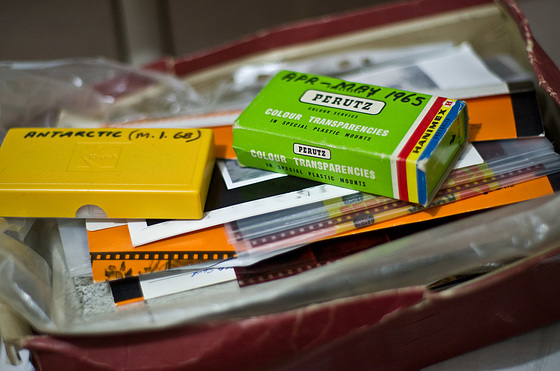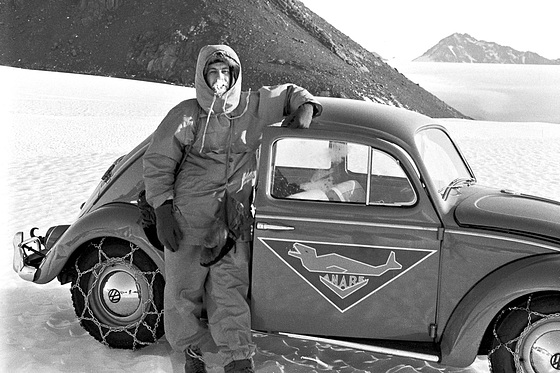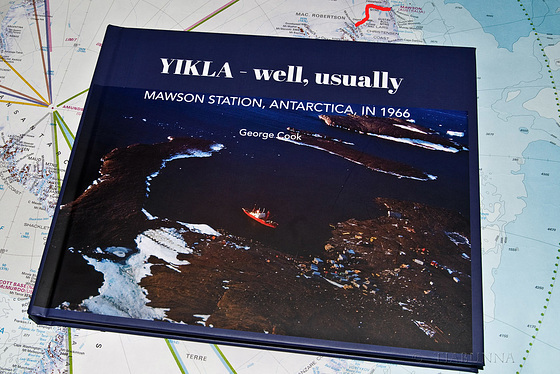If you're like most people on this site, I suspect you take a few thousand photos yearly. I know I do. I'll be honest, a great many of mine are hardly worthy of a second look, but they accumulate in my computer's hard disk. Maybe a hundred or so yearly warrant that second look. Some, though even fewer, deserve 'historical retention' (for want of a better term).
Let's work on the thought that the image of a great sunset, general landscape or flower isn't going to have 'historical retention' value unless it won some major prize. But very probably the photos of the kids, family heirloom photos (think of Tacheles' photos by his Great-aunt Sophia in the early 1900s), and other shots of significant times or events will be worth passing to later generations. Maybe not all excel technically, but the content creates the value.
Sadly, in many cases, unless the images are accompanied by some notation to identify who or what they're about, they become almost meaningless. We have 'heirloom' family photos which fail that test. Anonymous (presumably family) people from the 1800s, photos my father took in the Pacific in WW2: all meant something to those who took or were in them, now the relevance is lost and the images almost worthless.
That would be the case with almost all the images in my computer, assuming someone was prepared to wade through all the 'unimportant' stuff to find those of long term value. Then again, I also have collections of negatives, prints, and colour slides, taken in pre-digital times. Most are unlabelled, even those I consider significant.
Let's work on the thought that the image of a great sunset, general landscape or flower isn't going to have 'historical retention' value unless it won some major prize. But very probably the photos of the kids, family heirloom photos (think of Tacheles' photos by his Great-aunt Sophia in the early 1900s), and other shots of significant times or events will be worth passing to later generations. Maybe not all excel technically, but the content creates the value.
Sadly, in many cases, unless the images are accompanied by some notation to identify who or what they're about, they become almost meaningless. We have 'heirloom' family photos which fail that test. Anonymous (presumably family) people from the 1800s, photos my father took in the Pacific in WW2: all meant something to those who took or were in them, now the relevance is lost and the images almost worthless.
That would be the case with almost all the images in my computer, assuming someone was prepared to wade through all the 'unimportant' stuff to find those of long term value. Then again, I also have collections of negatives, prints, and colour slides, taken in pre-digital times. Most are unlabelled, even those I consider significant.
And I haven't even started to talk about the colour print photos from the 1970s. I presume the condition of those is much the same worldwide: the colour has long since 'fallen out' and the prints have faded to a dullish orange colour with almost no contrast. Now unusable. At least I have the negatives for most, if I get around to copying them.
What if, long ago, we'd had digital cameras? We bought an Amstrad 6128 computer way back in the 1980s, it had 128K of memory compared to only 64K in the Commodore 64 (!!), but it had a different floppy disk to any other computer. At work there were computers with large paper packet floppy disks (those really were “floppy” :-)). And the interesting thing is that none of the material from the various disks or software of those times would be readily accessible today. My current computer doesn't have a floppy disk reader of any kind and even CD/DVDs are becoming obsolescent. Digital storage has very clear limitations.
Save the material on the hard disk? A year or two back I had a hard disk crash: are all your digital images backed up? Maybe put them on 'the cloud'? Just the past few days, I was told that an early internet social forum “Friends Reunited” is about to close – and have you checked the ipernity blog item “Uptime 3535”? If not, I'd strongly suggest doing so right now.
So the message from all that is that I see electronic records as a very mixed blessing, useful indeed in the “here and now” but rather ephemeral. And loose 'hard copy' images without detail are useless. If you want to save something you consider important for posterity, what's the answer?
I have a good general idea of what among my collections I consider of value (in a long term personal/family historical sense). And that is why I have been busy copying my collection of slides and negatives, such as this one.
What if, long ago, we'd had digital cameras? We bought an Amstrad 6128 computer way back in the 1980s, it had 128K of memory compared to only 64K in the Commodore 64 (!!), but it had a different floppy disk to any other computer. At work there were computers with large paper packet floppy disks (those really were “floppy” :-)). And the interesting thing is that none of the material from the various disks or software of those times would be readily accessible today. My current computer doesn't have a floppy disk reader of any kind and even CD/DVDs are becoming obsolescent. Digital storage has very clear limitations.
Save the material on the hard disk? A year or two back I had a hard disk crash: are all your digital images backed up? Maybe put them on 'the cloud'? Just the past few days, I was told that an early internet social forum “Friends Reunited” is about to close – and have you checked the ipernity blog item “Uptime 3535”? If not, I'd strongly suggest doing so right now.
So the message from all that is that I see electronic records as a very mixed blessing, useful indeed in the “here and now” but rather ephemeral. And loose 'hard copy' images without detail are useless. If you want to save something you consider important for posterity, what's the answer?
I have a good general idea of what among my collections I consider of value (in a long term personal/family historical sense). And that is why I have been busy copying my collection of slides and negatives, such as this one.
In recent weeks I have been busy putting many of the more significant of my Antarctic photos, taken 50 years ago (where has the time gone?) into book form. Over the past few days I have finished and it is now published. In it, apart from the photos, I have included words and explanations to make the strange doings and technology of pre-internet days comprehensible to younger readers: how many of them would have heard of (or know the purpose of) a teleprinter or a telegram boy? I am passing copies of my book to family members.
Some of the images and stories you can read on my “Antarctica back then” album www.ipernity.com/doc/tiabunna/album/471761, but there are many more in the book. If you're interested, you can see a preview of it here www.blurb.com/b/6854165-yikla-well-usually and you also can purchase a copy of the book through that site. I hope to also make it available as an Ebook (update: since done). The book tells the story of living and working at Mawson Station in 1966 and on a four month surveying trip to remote and previously unvisited mountains, with just six other people and only morse code radio contact with the outside world. I have shown the book and our survey trip route in red on the following photo.
Some of the images and stories you can read on my “Antarctica back then” album www.ipernity.com/doc/tiabunna/album/471761, but there are many more in the book. If you're interested, you can see a preview of it here www.blurb.com/b/6854165-yikla-well-usually and you also can purchase a copy of the book through that site. I hope to also make it available as an Ebook (update: since done). The book tells the story of living and working at Mawson Station in 1966 and on a four month surveying trip to remote and previously unvisited mountains, with just six other people and only morse code radio contact with the outside world. I have shown the book and our survey trip route in red on the following photo.
I hope this article gives you some food for thought on which of your images you may want to leave as 'significant items' for posterity and how you might go about ensuring that they retain their relevance and accessbility.



30 comments
Roger (Grisly) said:
It is for this very reason I have spent years scanning and logging old family photographs and slides, From time to time I give a Cd of all these image and information to my children and family members, hopefully it will not be lost this way.
tiabunna replied to Roger (Grisly):
beverley said:
tiabunna replied to beverley:
Pam J said:
I LOVE BLURB!! I have been using it for around 8 years now... and one of the latest projects started 2 years ago it to make a Heritage Book of the old family photos I have.
So... this article certainly rang a bell for me.
tiabunna replied to Pam J:
Janet Brien said:
It is a huge job to keep photos in order. I try to hack through mine and toss whatever I can, and all of them are organized into folders describing the day or event. It MUST be done for memory's sake!
tiabunna replied to Janet Brien:
Polyrus said:
Whilst I do not profess to be so efficient, I copied all my family slides and travel negs (most but not all annotated), from my hard drive onto a DVD for my son. What he does with them is his choice.
Railway images are a different matter entirely. I still have not scanned all that I have but those I have scanned are finding their way onto eBay where most sell for several times more than their vintage film cost me. There is a huge demand for railway history in the UK. Why keep original negs and slides which are deteriorating annually, when they may give much pleasure to others ...and also keep me in pocket money.
tiabunna said:
Lian said:
tiabunna replied to Lian:
just"jj" said:
:)
Thanks.
tiabunna replied to just"jj":
Herb Riddle said:
This is also a warning of how our memories are stored and displayed. When I retired some seven years back, the first thing I did with my new found time was to digitise my large library of 10,000+ slides. They are copied on at least two hard disc but as you say, who but me really cares. When I am gone - the disc will no doubt be scrapped as being too much trouble to explore. Anyway, who is really interested in my childhood holidays by the sea on a bad weather day? I think your book is clearly the best long term answer and is certainly worth recording. I shall try to check out more of your Ipernity Antarctica Album and perhaps keep an eye open for the real book too.
Thanks for bringing this to our notice.
Best Wishes, Herb
ps I used to have a Commodore Pet computer with 8K RAM, 9" green screen -no sound, but a digital tape storage recorder -which I still have but I cannot access the info any more!!!!